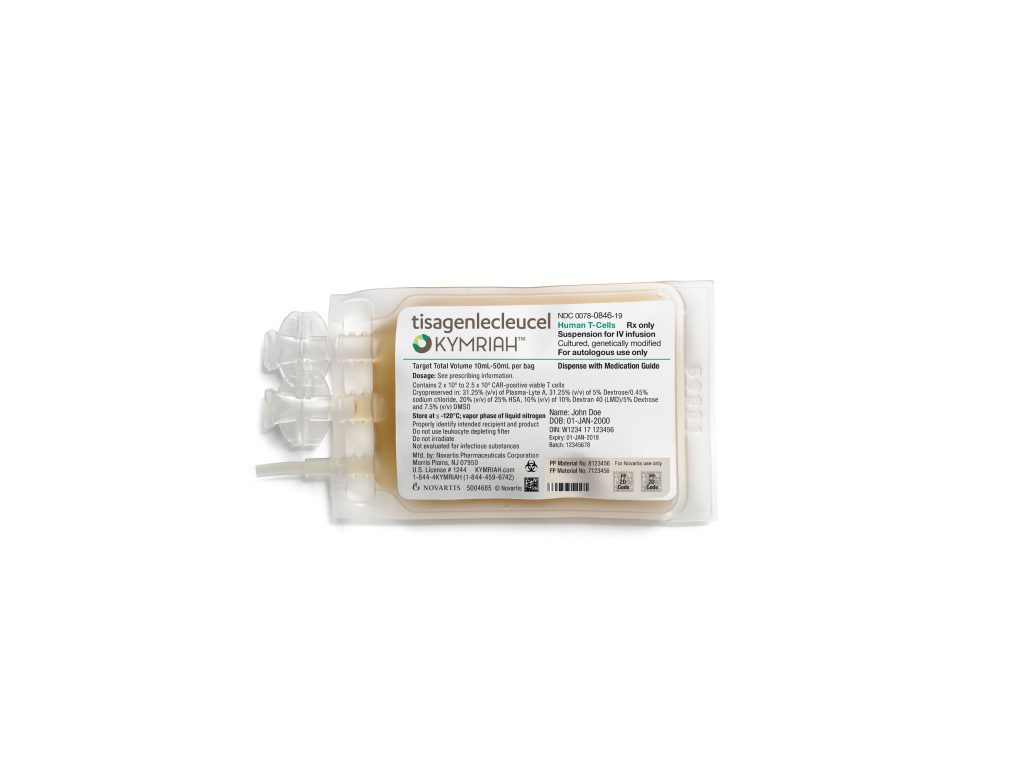This week, the US Food and Drug Administration (FDA) approved the first CAR-T immunotherapy, marking a historic day for biopharmaceutical companies, researchers, physicians and patients. Novartis’ Kymriah (tisagenlecleucel) is indicated for the treatment of pediatric and young adult patients with refractory or relapsed acute lymphoblastic leukemia (ALL).
“We’re entering a new frontier in medical innovation with the ability to reprogram a patient’s own cells to attack a deadly cancer,” said Dr. Scott Gottlieb, FDA Commissioner. “New technologies such as gene and cell therapies hold out the potential to transform medicine and create an inflection point in our ability to treat and even cure many intractable illnesses.”
Kymriah uses a patient’s modified T-cells to recognize and kill cancer cells. After collection from the patient, the T-cells are genetically engineered to include a gene encoding a chimeric antigen receptor (CAR). This allows the cells to target leukemia cells displaying the CD19 antigen on their cell surface after the cells have been reinfused back into the patient.
“Kymriah is a first-of-its-kind treatment approach that fills an important unmet need for children and young adults with this serious disease,” said Dr. Peter Marks, director of the FDA’s Center for Biologics Evaluation and Research (CBER). “Not only does Kymriah provide these patients with a new treatment option where very limited options existed, but a treatment option that has shown promising remission and survival rates in clinical trials.”
Results from the Phase II ELIANA clinical trial helped support the FDA’s approval of Kymriah. The small, open-label, single-arm study involved 68 patients enrolled in the trial through 25 international clinical sites.
After infusion, data from 63 of the patients was deemed suitable for efficacy evaluation. The results show that 83 percent of patients treated with the CAR-T immunotherapy reached complete remission within 3 months of receiving the therapy. In addition, those patients who responded to treatment tested negative for a biomarker of relapse.
“This therapy is a significant step forward in individualized cancer treatment that may have a tremendous impact on patients’ lives,” said Dr. Carl June, the Richard W. Vague Professor of Immunotherapy, Director of the Center for Cellular Immunotherapies in Penn’s Perelman School of Medicine , who is a pioneer of this new treatment. “Through our collaboration with Novartis, we are creating the next wave of immunocellular cancer treatments, and are eager to progress CAR-T therapy in a host of hematologic and other cancer types.”
Kymriah does carry a boxed warning for cytokine release syndrome, a rare but potentially life-threatening side effect of CAR-T immunotherapy, and has been approved alongside a risk evaluation and mitigation strategy (REMS), to be carried out by Novartis. The therapy requires just one treatment, and will reportedly be priced at $475,000.
ALL is the most common pediatric cancer in the US, affecting over 3,000 new patients each year. It is characterized by the accumulation of abnormal lymphocytes in the bone marrow and blood.
While patients diagnosed with ALL are often treated with a combination of chemotherapy and radiation, relapse is common with just 10 percent reaching the five-year survival milestone. Kymriah is approved to treat patients who have relapsed at least twice.












Join or login to leave a comment
JOIN LOGIN